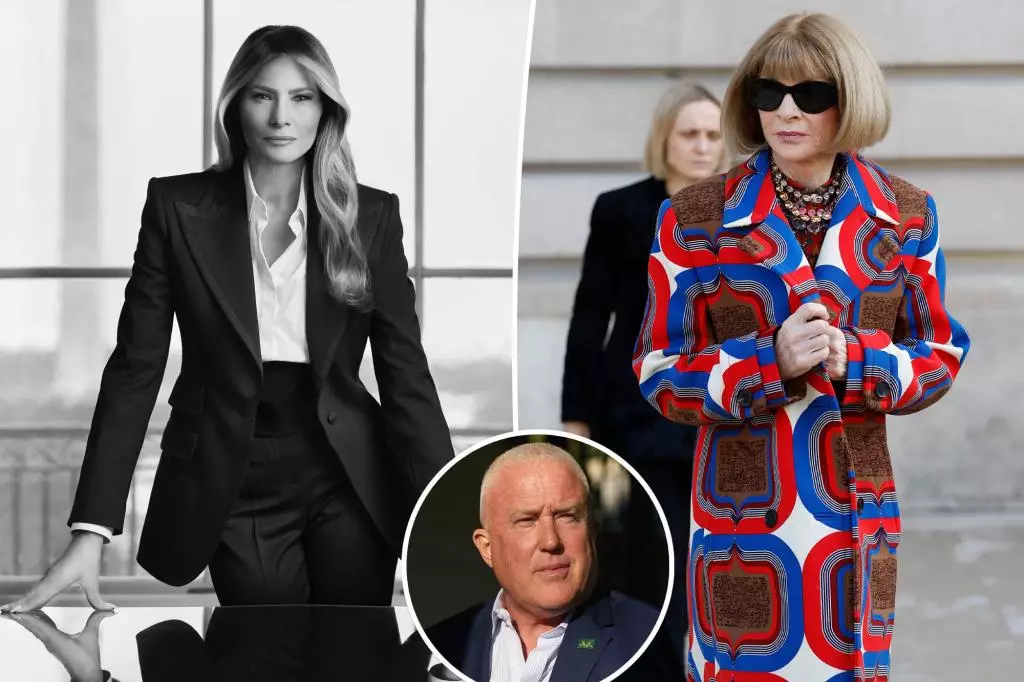Melania Trump’s relationship with the fashion industry has always been a topic of debate, and recent events have only intensified the discussions surrounding her persona and style. At the center of this controversy is Anna Wintour’s Vogue magazine, which came under fire from friends of the former First Lady over its critical portrayal of her in a recent op-ed.
Bill White, a close associate of Melania and Donald Trump’s appointee for the Ambassador to Belgium, has vocally defended the First Lady against the criticisms levied by Vogue. He has not only expressed admiration for Melania but has also encouraged her supporters to cancel their subscriptions to the magazine, branding it as “Condé Nasty.” This choice of words underscores the anger and betrayal felt by Melania’s inner circle regarding the fashion world’s perception of her. It reflects a growing trend where media houses are being scrutinized not just for their coverage but also for their perceived biases against specific individuals.
Among the criticisms mentioned in the Vogue piece was their pointed description of Melania’s official White House photo. The magazine suggested that in her portrayal, she appeared more suited for TV than for the responsibilities expected from a First Lady. This sentiment reflects the duality of Melania’s public persona: beloved by her friends and supporters yet often ridiculed in mainstream media. Such sharp critiques evoke questions about standards in public assessment and highlight the fine line celebrities walk between praise and ridicule.
In defense of Melania, White described her as “truly elegant and eloquent” and praised her multifaceted identity as a mother and partner. However, the juxtaposition between these accolades and Vogue’s portrayal paints an inconsistent image of what elegance means in the context of modern fashion and public life. Supporters argue that Melania embodies a unique style that blends intelligence and beauty. By citing her fluency in seven languages and her business acumen, they seek to amplify a narrative that goes beyond the surface-level critiques of her style.
Yet, Vogue’s perspective highlights an ongoing discourse about the expectations placed on First Ladies. Should they adhere to traditional fashion standards, or is there room for a more diverse expression of identity? Melania’s decision to reject the notion of appearing on the cover of Vogue reflects a broader resistance to conforming to an industry that she feels has not backed her in the past, with friends suggesting that many designers refuse to dress her altogether.
Despite Melania’s apparent ambivalence towards the fashion world, her supporters remain adamant about her contributions. Some insiders claim that the fashion community’s long-standing biases against her stem from broader political affiliations, suggesting that her identity as a Trump associate has influenced industry behavior. Amidst this backdrop, there is an underlying feminist angle that emerges from the chatter; it poses questions about how women in positions of power are treated based on their associations and choices.
The discussion surrounding who should be featured in prominent publications also brings to light the cultural significance of representation. Supporters are now rallying behind proposals for Usha Vance, Mike Pence’s wife, to grace the cover of Vogue instead. This suggests a dissatisfaction not only with the representation of Melania but also with how the media portrays political wives in general.
The Broader Implications for Media and Representation
In the long run, the friction between Melania Trump and the fashion industry poses larger questions about media representation, especially for public figures who are often subjected to scrutiny based on their personal lives and associations. As Vogue has opted to celebrate figures like Jill Biden, the public’s reaction towards such stylistic choices could shape future narratives surrounding femininity, power, and elegance in contemporary society.
While the Mar-A-Lago elite continue to defend Melania, the ongoing strife between fashion and politics stirs up a conversation that may influence how future First Ladies will navigate their roles. As Melania moves forward without the allure of magazine covers, one can’t help but wonder if her journey through the complexities of public perception could ultimately redefine the role of style, substance, and self-identity in an increasingly polarized world.

